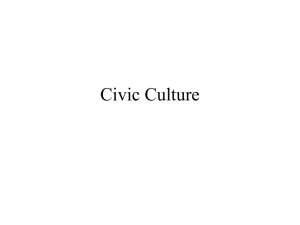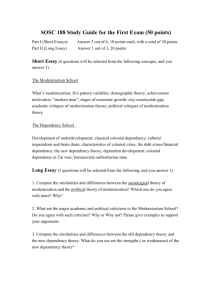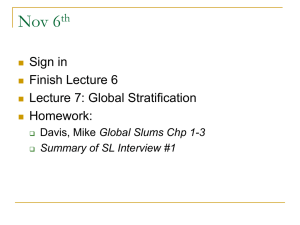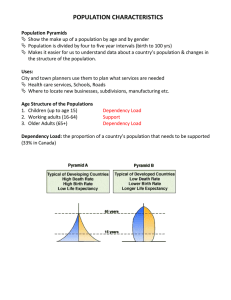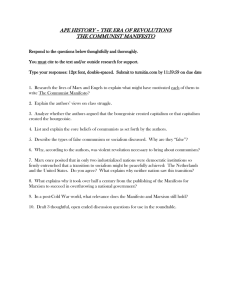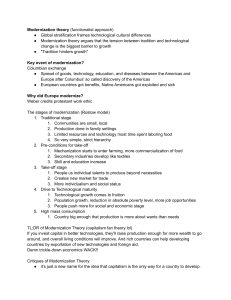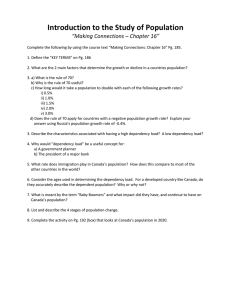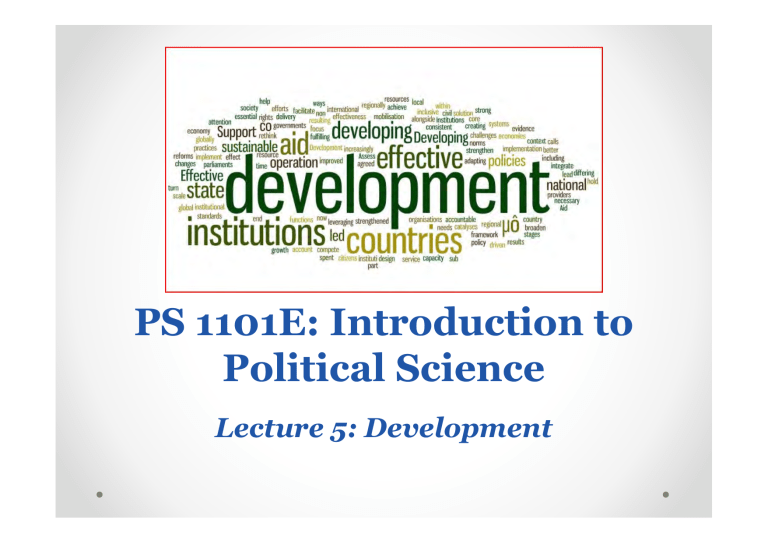
PS 1101E: Introduction to Political Science Lecture 5: Development Overview 1. What is Development? 2. Historical Context & Meanings of Development 3. Characteristics of Development o Social o Economic o Political 4. Explaining (Under)Development o o o o Modernization Theory Colonization & Dependency Theory Neoliberalism Developmental State First Observations Underdeveloped countries tend to be countries: • Politically Marginalized: that rely upon foreign aid and official development assistance, and are largely forced to react to global changes rather than play significant part in influencing those changes • Economically Marginalized: with a limited economic base and financial resources, rely heavily on agriculture, on one or two major exports, such as coffee, oil, copper, fruit, and on imported manufactured goods and machinery First Observations • Weak political regimes and institutions: Unstable civilian political institutions, with low levels of legitimacy and public acceptance, primarily dominated by personal rule, military dictatorships, and one-party rule or making transitions to democracy; • Historical Legacies: one time European colonies, weak sense of national identity. Mainly because their borders were laid down by competing European powers, with little regard for local differences. Why are some countries developed while others remain underdeveloped? Power and Authority Development or Underdevelopment DecisionMaking What is Development? • Development has been equated to modernization, catching up with “advanced” countries. Why? • Phrase used mainly at end of World War II – world-wide struggle for improved living conditions in developing countries • Push to “develop” newly independent countries through expansion of education, infrastructure, etc. • Supported by aid agencies (World Bank), developed countries and United Nations bodies • BUT, Widely accepted notion does not consider, individual societal objectives What is Development? • Sociologists have offered a more culturally sensitive definition • Organized intervention in collective affairs according to a standard of improvement • What constitutes improvement and what is appropriate intervention will depend on class, culture, historical context Evolution of the D word … • Understanding the term development, cannot be separate from the Industrial Revolution. • Growing importance of technology and organized production • Transformed the way in which goods production – unprecedented expansion of output and productivity • Resulted in new organizational, social, economic, and political developments – to support industrialization & production • Resulted in some states having the capacity to harness this new mode of production, while others remained backward Evolution of the D word … Development in Context • For latecomers, development meant “catching-up” • For the early adopters, development meant, further enhancing: o Industrialization o Resource management (colonization) o Profits • Also, social questions – urban squalor, exploitation of labor and the dark side of industrialization Karl Marx • German philosopher, political economist and revolutionary • Interest in economics was fueled by Friedrich Engels – friend, collaborator and benefactor • Observed class struggles intensifying as the “bourgeoisie (industry owners) exploit the proletariats’ (workers) worth…their means to produce”. Communist Manifesto •Marx and Engels were commissioned by The Communist League to write its manifesto and mission statement . •Throughout Europe revolution was in the air during the 1840s. In 1848, France, Britain, and Germany all suffered huge socialist uprisings. •Published in February of 1848, the Communist Manifesto would be the vehicle to spread the Idea of Scientific Socialism and bring momentum to the cause. •The Manifesto was first published as a pamphlet in London, February 1848. •It’s circulation is in the hundreds of millions. •It is considered by many to be one of the greatest works of social literature of all time. Das Kapital •Published first in 1867, Das Kapital was much more critical of capitalism than The Communist Manifesto. •Where the Communist Manifesto was a calling for others to join the cause, Das Kapital was more a academic reference text. •Das Kapital took an in depth look at the history of society and the impacts of economics on the human condition. •Marx intended to publish a total of three volumes of Das Capital, but deceased on March 14,1883, before the final two volumes reached print. •Friedrich Engels completes the final two drafts and brought them to print in 1885 and 1894. •Das Kapital continues today to be a most valuable source of information regarding economics and labor. Essence of Marxism • Capitalism was destined to fail – it contained the seeds of its own destruction • The development of Modern Industry, therefore, cuts from under its feet the very foundation on which the bourgeoisie produces and appropriates products. What the bourgeoisie therefore produces, above all, are its own grave-diggers. Its fall and the victory of the proletariat are equally inevitable. (Communist Manifesto) Essence of Marxism • The proletariat (workers) would seize control from the bourgeoisie (capitalists) • Socialist revolution • The proletariat would seize control from the bourgeoisie – revolution “The Communists disdain to conceal their views and aims. They openly declare that their ends can be attained only by the forcible overthrow of all existing social conditions. Let the ruling classes tremble at a Communistic revolution. The proletarians have nothing to lose but their chains. They have a world to win.” (Manifesto) Implication Industrialization (Development) Revolution Characteristics of “Development” How do we know if a country or society is developed? • Organizational: Are groups and institutions more specialized, interdependent, and differentiated in their roles & functions? • Technological: Are production and services based on complex and sophisticated means? • Attitudinal: Is social life dominated by scientific knowledge, rationality, secular values, and individualism? Characteristics of “Development” Perhaps more useful to categorize development into three facets Development Social Economic Political “Social Development” Inkeles and Smith (1999): • Openness to new experiences • Traditional Allegiances Modern Allegiances • Confidence in Modern Technologies • Desire for Social Mobility • Planning & Punctuality • Interests in local politics and community affairs • Interest in news and international affairs “Social Development” • Knowledge: Adult literacy rates • Urban Lifestyle: percentage of population in urban areas • Housing: Access to adequate, safe, and affordable housing and basic services • Health: longevity and infant mortality rates • Communication: cell phones and computers per capita, internet penetration • United Nations Human Development Index & World Bank Development Indicators “Economic Development” • Economic growth economic development. • Gross Domestic Product Per Capita • Gross National Income Per Capita • Other relevant indicators to economic growth, such as capital stock, employment, investment, savings, consumption, government spending, imports, and exports • World Bank Reports “Political Development” • Concentration of Power in State • Specialized Political Structures & Bureaucratic Apparatus • Reliance and Support of Political Processes, Participation • Extensive State Capabilities: o Extractive o Regulative o Distributive o Symbolic Which comes first? • Economic development before social and political development? Argument is premised that democracy succeeds with some form of societal maturity • Without political development (strong government and institutions), economic growth and urbanization may not be possible? Argument is premised that democracy without strong and institutions leads to chaos Modernization Theory • Views human history in evolutionary terms Underdeveloped Third World societies are less “evolved” than first the world [cultural, political and economic components] • Elements of Social Darwinism, Social Evolution • Identifies social/societal attributes that contribute or impede modernization • Key Thinkers: o o o o o o Talcott Parsons Max Weber Seymour Martin Lipset Walt Rustow Samuel Huntington Ronald Inglehart Modernization Theory Traditional 1. Affect, charisma emotion 2. Personal ties 3. Custom, social practices, habit 4. Family, social community, religion 5. Non-institutionalized Modern 1. Rationality 2. Impersonality 3. Written rules of conduct 4. Bureaucratic, institutionalized, hierarchical 5. Meritocracy 6. Division of Labor Max Weber Modernization Theory • Linear Stages of Development (Rustow 1960) • Economic development occurs (a must??) in established stages 1. 2. 3. 4. 5. Traditional Society: agriculture; primary sector based; limited technology; static or rigid societies (no mobility) Preconditions for Take-Off: commercial agriculture; increasing infrastructure development; technology; some social mobility Take-Off: beginnings of manufacturing sector; goods producing Maturity: diversification of industrial base; investment in social infrastructure Age of Mass Consumption: industrial base dominates society; consumption of high-end goods • What leads to these stages? Modernization Theory What matters for the take-off? 1. Economic development (prerequisite) then democracy; 2. Enhance the capacity of political system; 3. Political culture, transformed from traditional societies into modern societies; 4. Industrial and democratic Western countries are the model for the latecomers to emulate; 5. Third World societies should look to the modern and developed Western societies for guidance; 6. Western countries should transmit modern values, institutions, technology, financial investment to the Third World countries. Critiques of Modernization Theory • Biased and Ethnocentric: development categories, stages, and processes are derived from Western experience • Alternate Paths to Development: Third World countries neither have to use democratic institutions or reach a Western level of development to be considered successful. • Misinterprets Role of Tradition: Often possible for developing countries to retain their own traditional cultural attributes along with a modern economy • Western Dominance: a political ideology that is tended to promote the Western values and used to justify Western dominance Dependency Theory • Dependence = reliance on something else for support, sustenance • Theory describes developing countries dependence on another country for support • Marxism turned on his head – focus is on exchange than production • Underdevelopment and development two sides of the same coin • Key issue is how developing world is integrated into the global economy Dependency Theory • Premise is capitalist world system in which countries are divided into: o Core and semi periphery and periphery • Core countries are rich industrialized countries of the world • Semi-peripheries are the newly industrialized countries such as China, Taiwan, South Korea, Brazil, Venezuela, Mexico, Indonesia etc. Dependency Theory • Periphery provide raw materials for the core countries • Core countries process and sell manufactured goods • Trade is monopolist as it is controlled by the core • These exchanges form the basis for dependency and underdevelopment Dependency Theory • Dependency a function of colonialism and the perpetuation of the unequal international division of labor and exchange of capital • Political economy of the periphery then restructured post-colonialism to meet the needs of the core countries, thereby leading to the underdevelopment Critiques of Modernization Theory • In “looking outward” and attributing underdevelopment to its external relations in the world market, dependency theorists overlook the impact of the internal constraints of the underdeveloped countries -- the economic, political, social, and cultural characteristics and structures of these countries • The policy implications of dependency theory for development: o Break-up the established international trading system, for a more “equalitarian world-system” o Periphery states cooperate to offset the power of the core • However, will do the above be done if they are already dependent? Modernization vs. Dependency • Theories have provided solutions to possible Third World development: - Increase in modernity - Independence and de-linking from the world economy - Reform of the global capitalist system • Which side do you think has more power for explaining the Third World (under)development in the last several decades? Neoliberalism • Free market Development • Choice in the market needs to be maintained – economic freedom of individuals, households, firms • Why? Market interventions undermine and distort efficiency • Developmental Policy Outcomes: o Limited role of the state, only to ensure fiscal & monetary discipline o Expansion of privately held commercial enterprises o Free trade and open foreign investment • Encouraged since the 1970s due to failure of import-substitution-models • Massive privatization and deregulation in the 1980s Neoliberalism in Britain Critiques of Neoliberalism Developmental State Approach • Premised on an activist state (government), one with significant political authority over societal forces • May involve some light coercion • Key roles of the state: • Ensure private, market-based system • Active intervention to promote and protect certain firms/industry in the global economy (different from importsubstitution) • Drawn from the experiences of Japan (Chalmers Johnson 1983), later seen in Taiwan, Hong Kong, Singapore, South Korea. Development State Approach Critiques of the Developmental State • As the developmental state largely works with technocratic (capable civil servants): • Governments may not bet particularly well. • Also, policymakers while good at following the market, debatable how effective they are at staying in front of the market, ahead of the innovation curve • Private-sector firms may be to reliant on government support and less attuned to market conditions, to know when opportunities arise and when diversify Key Takeaways 1. What is development? 2. What constitutes development 3. How can we explain development and underdevelopment?
